Nigeria’s run to today’s Africa Cup of Nations final against hosts Ivory Coast is a personal triumph for coach Jose Peseiro, the veteran from Portugal who had been the subject of stinging criticism in the buildup to the tournament.
The 63-year-old had been widely written off in Nigeria as the wrong man for the job long before they opened their Cup of Nations campaign with a 1-1 draw against Equatorial Guinea in Abidjan on Jan. 14.
Yet four weeks later he is to lead the Super Eagles out at the same Ebimpe Olympic Stadium for a showdown against Ivory Coast as Africa’s most populous nation aims to become continental champions for the fourth time.
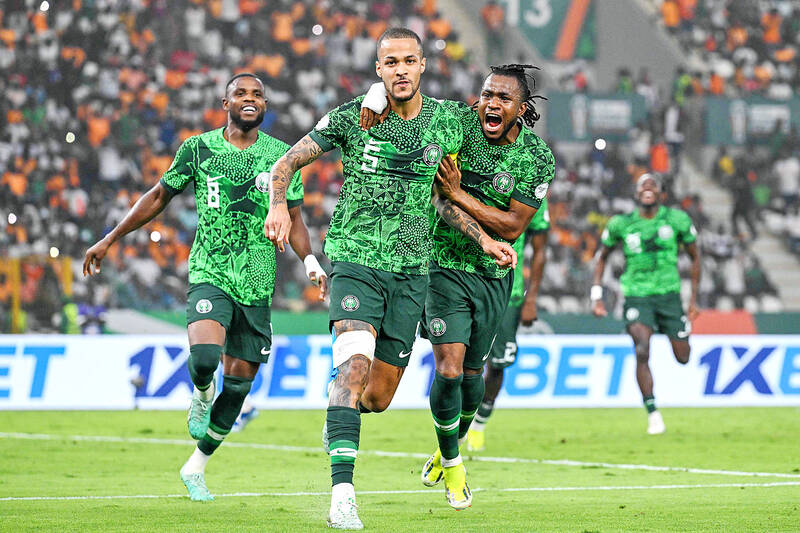
Photo: AFP
The way in which Peseiro has done it has been somewhat counterintuitive.
Nigeria scored more goals than any other team in qualifying for the Cup of Nations, and in prolific striker Victor Osimhen they have the reigning African Player of the Year in their ranks.
Peseiro also has a wealth of other top-class attacking options and yet he responded to that poor opening result by changing to a new system featuring three centerbacks.
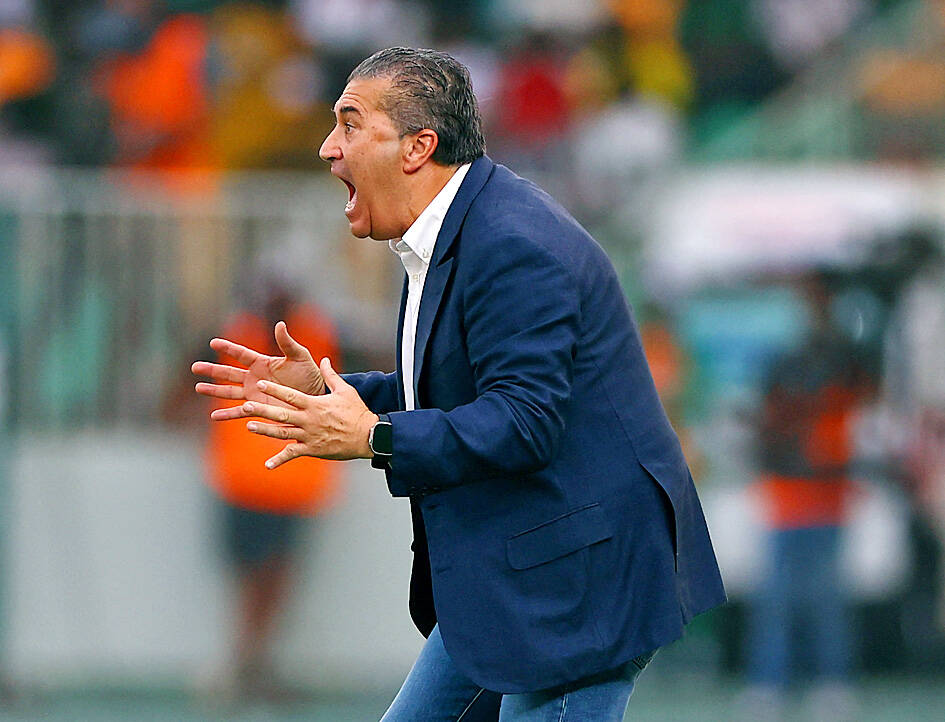
Photo: Reuters
The emphasis would now be firmly on not conceding goals.
“You cannot play 10 guys in attack. No team can win that way,” Peseiro said at Nigeria’s Abidjan base before they faced Ivory Coast in their second match.
“We try to command and control the game every time, it is our style. We have players to do that. It is different to the football Nigeria played before, with more power, speed, strength and fight,” he said. “Our players have different characteristics, so you need to adapt, but give balance at the same time, make sure your team does not concede goals.”
The impact was immediate, as Nigeria beat Ivory Coast 1-0 in their second game and then defeated Guinea-Bissau, also 1-0.
A 2-0 win over Cameroon came next in the round-of-16, before they edged Angola 1-0.
After four successive clean sheets came a 1-1 draw at the end of extra-time in the semi-final against South Africa, as Nigeria emerged victorious on penalties.
He has faced continued criticism since taking over in May 2022, despite a record which he staunchly defends.
Nigeria’s only competitive defeat in that time remains a 1-0 home loss to Guinea-Bissau in Cup of Nations qualifying.
“Until now Nigeria have lost one official match, one, but many people — I don’t know why — still speak, speak, speak about that one match,” Peseiro said after beating South Africa.
The man who was once assistant to Carlos Queiroz at Real Madrid and who took Portugal’s Sporting to the 2005 UEFA Cup final had initially agreed to take the Nigeria job after leaving his role as Venezuela coach over unpaid wages.
The deal was called off just after the 2022 Cup of Nations, only to be revived in May that year.
However, it was reported that he again had issues receiving his salary before the head of the Nigeria Football Federation in June last year announced that he would organize a fan poll to decide if Peseiro should be sacked.
That telephone vote would have the advantage of generating much-needed funds for the federation.
“Maybe we didn’t get it right in the area of getting the right person,” Ibrahim Gusau told a radio show.
Peseiro was kept on and in September last year agreed a pay cut from a reported US$70,000 per month to US$50,000, but things did not get easier, as Nigeria began 2026 World Cup qualifying with two poor results in November last year, drawing 1-1 with Lesotho and Zimbabwe.
“Peseiro has to go, he’s a bad coach,” Nigerian journalist Wale Ajayi said after those results. “Renewing his contract was renewing disaster.”
Peseiro held on, and did so again despite that poor opening result against Equatorial Guinea — in contrast to his first taste of international management, when he was dismissed by Saudi Arabia after they lost their opening game at the 2011 Asian Cup.
Jovial and happy speaking to journalists in Ivory Coast, Peseiro has appeared untroubled by all the criticism and has focused solely on returning to Nigeria with the trophy.
“Nigeria creates expectation, our shirt weighs heavier than other shirts,” he said. “We have 220 million people who want and need to win. They need some happiness in their lives, and they push us a lot.”
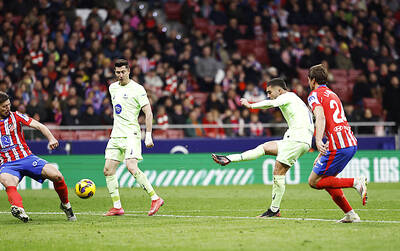
Barcelona’s Ferran Torres scored twice on Sunday to help secure a late 4-2 comeback win at Atletico Madrid in a pulsating La Liga clash that took the Catalan side back to the top of the table. Barca have 60 points and a game in hand after last week’s postponement of their home game with CA Osasuna. They are level on points with Real Madrid, who won 2-1 at Villarreal on Saturday. “I am happy and proud of this team,” Barcelona head coach Hansi Flick told a news conference. “They never give up... It’s a great three points and we are happy to
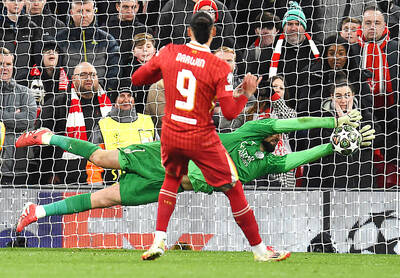
Paris Saint-Germain on Tuesday held their nerve to beat Liverpool 4-1 on penalties and reach the UEFA Champions League quarter-finals after their tie finished one-apiece on aggregate, while Bayern Munich saw off Bayer 04 Leverkusen to complete a 5-0 win over both legs. Lamine Yamal and Raphinha fired Barcelona into the next round as the Catalans bested SL Benfica 3-1, and Inter booked a last-eight meeting with Bayern by seeing off Feyenoord 2-1. At Anfield, Ousmane Dembele netted the only goal of the night as PSG bounced back from Liverpool’s late winner last week to force the tie to extra-time and penalties. Maligned
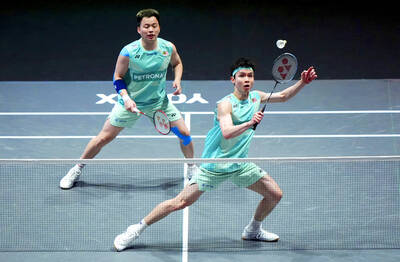
Taiwan’s Lin Chun-yi on Wednesday inflicted a first-round defeat on former badminton world No. 1 Viktor Axelsen at the All England Open. Lin came out of top after a back-and-forth first game before Axelsen dominated the second, but the Dane was not able to keep that form in the decider as Lin reeled off six points in a row on the way to a 21-19, 13-21, 21-11 victory. “If I don’t play my best, everyone can win against me,” said Axelsen, the world No. 4. “Today’s opponent played a fantastic game; it was disappointing, but that is how it is.” “I just tried
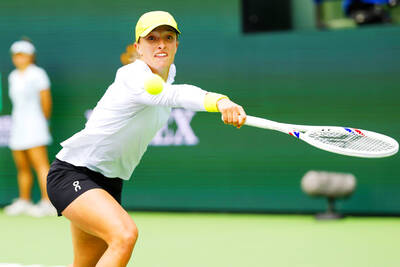
Two-time Indian Wells champion Iga Swiatek on Thursday avenged her shock Paris Olympics loss to Zheng Qinwen with a 6-3, 6-3 win over the Chinese eighth seed, setting up a semi-final against 17-year-old Russian Mirra Andreeva in the California desert. In the men’s singles, Spain’s Carlos Alcaraz put on a show with his acrobatic shotmaking under the lights to close out the day’s action, overcoming a 4-1 second-set deficit to defeat Francisco Cerundolo 6-3, 7-6 (7/4), while Taiwan’s Hsieh Su-wei crashed out of the women’s doubles. Swiatek, one of the gold medal favorites when she lost to eventual champion Zheng in the